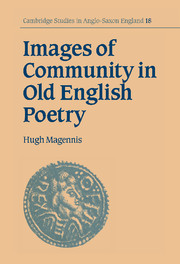Book contents
- Frontmatter
- Contents
- Acknowledgements
- List of abbreviations
- 1 Introduction: ideas of community and an Anglo-Saxon audience/readership
- 2 Hall and city, feasting and drinking: images of communal life
- 3 Hall and feasting in Beowulf
- 4 Hall and feasting: transformations and alternative perspectives
- 5 Personal in conflict with communal
- 6 The mythic landscape of Beowulf: sea, stronghold and wilderness
- 7 The dwelling-places of God's people: place and setting in biblical poetry
- 8 Places of trial and triumph in hagiographical poetry
- 9 Conclusion: community and power in later poetic and other texts
- Bibliography
- Index
2 - Hall and city, feasting and drinking: images of communal life
Published online by Cambridge University Press: 14 August 2009
- Frontmatter
- Contents
- Acknowledgements
- List of abbreviations
- 1 Introduction: ideas of community and an Anglo-Saxon audience/readership
- 2 Hall and city, feasting and drinking: images of communal life
- 3 Hall and feasting in Beowulf
- 4 Hall and feasting: transformations and alternative perspectives
- 5 Personal in conflict with communal
- 6 The mythic landscape of Beowulf: sea, stronghold and wilderness
- 7 The dwelling-places of God's people: place and setting in biblical poetry
- 8 Places of trial and triumph in hagiographical poetry
- 9 Conclusion: community and power in later poetic and other texts
- Bibliography
- Index
Summary
The dominant feature of the poetic landscape which surviving Old English verse as a whole presents to its readers is the hall in which the life of society is carried on. In the aristocratic world portrayed in most Old English poetry the hall dominates the landscape in a literal sense: it stands, to quote a phrase from Beowulf, ‘heah ond horngeap’. More significantly, it dominates the landscape in a metaphorical sense, for the hall appears in Old English poetic texts as the focus and centre of people's communal being. Other types of building are mentioned (comparatively rarely) in Old English poetry – temples, churches, hermit cells, and so on – but, apart from individual Riddles, there is hardly a poem in Old English literature in which the concept of the hall and of life in the hall is not at least alluded to; and in many poems hall activities remain consistently in the foreground. The hall appears in riddles, maxims and poems of religious exhortation, as well as in narrative and lyric texts. As is well known, exotic social structures, such as those found in the Bible, are at least partly recast in Old English poetry in terms of hall culture. The concept of the city is preserved in the adaptation of biblical and hagiographical works, but appears superimposed on, or fused with, the communal image of the hall, as in the image from The Ruin discussed above.
- Type
- Chapter
- Information
- Images of Community in Old English Poetry , pp. 35 - 59Publisher: Cambridge University PressPrint publication year: 1996



